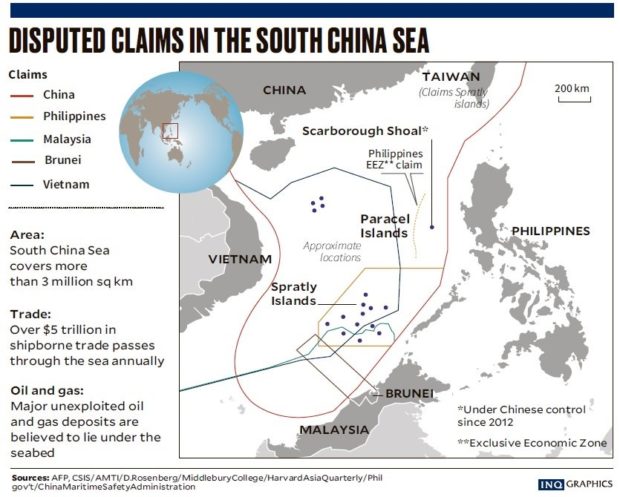
Disputed claims in South China Sea
MANILA, Philippines — Allowing Chinese fishermen to fish in the Philippine Exclusive Economic Zone (EEZ) in the West Philippine Sea is against the Constitution, Supreme Court Senior Associate Justice Antonio Carpio said Tuesday.
Carpio made the statement after Malacañang said it would allow China to fish in the country’s waters because they were “friends.”
“I don’t think China would do that [stop fishing in Philippine territory]. Why? Because we’re friends,” President Rodrigo Duterte said when asked if the Philippine government would prevent Chinese fishers from venturing into Philippine territorial waters.
Presidential spokesman Salvador Panelo said it could not be considered treason because it was “allowed under international laws.”
READ: Out of friendship, PH will ‘tolerate’ China to fish in country’s EEZ – Palace
But Carpio refuted the Duterte administration.
Quoting the 1987 Constitution, he said: “The State shall protect the nation’s marine wealth in its … exclusive economic zone, and reserve its use and enjoyment exclusively to Filipino citizens.”
This, Carpio said, means that “the Philippine Government cannot allow Chinese fishermen to fish in our EEZ in the West Philippine Sea. This also means that the ‘use and enjoyment’ of the fish in our EEZ is reserved exclusively to Filipinos.”
According to Carpio, the President, as commander-in-chief, has the constitutional duty to direct the Armed Forces to protect the nation’s marine wealth in the Exclusive Economic Zone.
Under the Constitution, he pointed out that “national territory” includes “other submarine areas” over which the Philippines has “sovereignty or jurisdiction.”
Carpio pointed out that in 2016, The Hague already ruled with finality that the Philippine has “jurisdiction” over its Exclusive Economic Zone in the West Philippines Sea, including the Reed Bank, locally known as Recto Bank.
“The Philippines has exclusive sovereign right to exploit all the fish, oil, gas and other mineral resources in its Exclusive Economic Zone. This sovereign right belongs to the Filipino people, and no government official can waive this sovereign right of the Filipino people without their consent,” Carpio said.
(Editor: Alexander T. Magno)